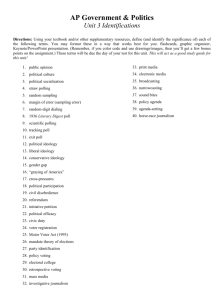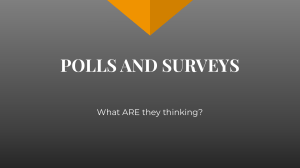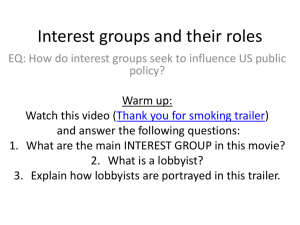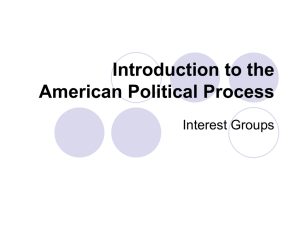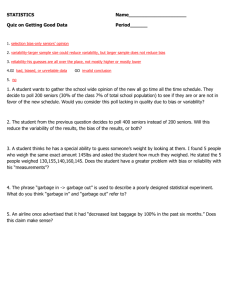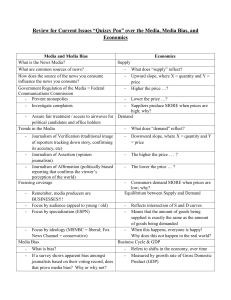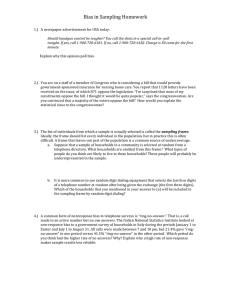Click
advertisement
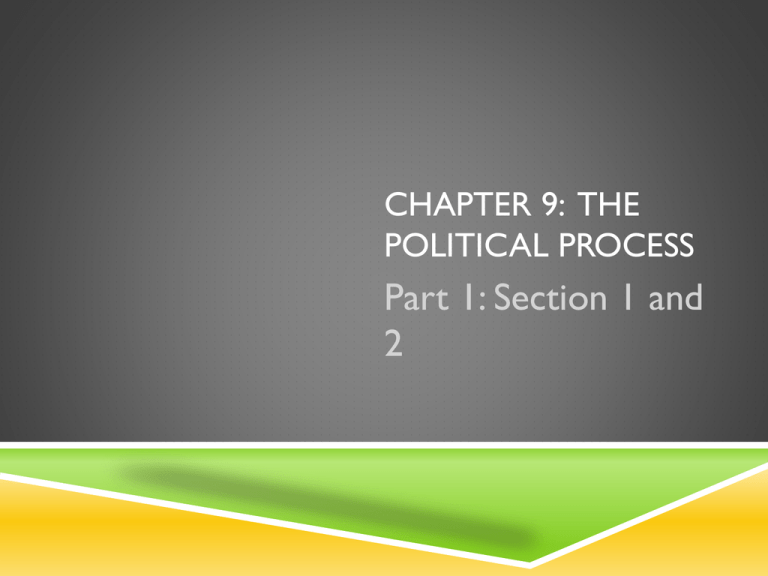
CHAPTER 9: THE POLITICAL PROCESS Part 1: Section 1 and 2 PUBLIC OPINION • Public Opinion: the aggregation of views shared by a segment of society on issues of interest or concern. • Public opinion is limited to the community in question and who holds the opinion. Meaning? • Public opinion is complex and not limited to any one point-of-view. • Example: Global Warming- is it both natural and manmade? Is it irreversible? Should it be a concern? • Public opinion often shapes public policy. • Should it public opinion shape public policy? Should our democracy solely be a reflection of public opinion? Why or why not? Explain. GUN POLICY- PUBLIC OPINION ON OBAMA ADMINISTRATION- POLLINGREPORT.COM TWO THEORIES ON THE ROLE OF PUBLIC OPINION: • Public as single, centralized body to be shaped. • The public is to be led, formed, or molded by political and social leaders. • Public as many, separate publics to shape. • The public or people’s attitudes should shape society and policy makers. EXPRESSION OF PUBLIC OPINION • Assembly and/or Protest • Petitions to social and political leaders • Speech in social and established media • Formation of groups and organizations (MADD: Mothers Against Drunk Driving) • Voting FORMING PUBLIC OPINION • Individual political opinion is formed by a process called political socialization (the process by which people acquire political beliefs). • Family, School, Communities, Jobs, Demographics (age, race, ethnicity, gender, and religion) • Mass media shapes the individual, but shapes them in the context of a community by creating a mass, unique message. • Social media can create both individual and mass messaging. MEDIA AND PUBLIC OPINION • Mass Media: means of communication meant to reach a large population through various mediums (magazines, television, newspapers, blogs, radio, internet, and many others). • Social Media: a means of communication by which online communities share and publish as well as consume information. • Mass media systems influence public policy by: • Monitoring government activity • Creating an agenda by creating discourse (if the news says it is important, we think that it is important) • Shaping opinions through bias and propaganda or through the use of facts (which facts are used and what are left out) CREATING AN AGENDA- WHO ARE THEY AND WHAT IS THEIR VALUE? WHY DO YOU KNOW THEM (OR NOT)? A BRIEF UNDERSTANDING OF MASS MEDIA • American Factions: 1789- Gazette of the United States published a Federalist (political party) paper and the National Gazette published Democratic-Republican arguments. • Partisan politics has been in our media since the beginning of our nation. • Penny Press: cheap papers that catered to working class citizens. Significance? • Yellow Journalism: journalism which used sensationalism, scandals, and appeals to patriotism to attract and influence readership. • Origin: 1890’s- Joseph Pulitzer v. William Randolph Hearst • How do they affect the public? UNDERSTANDING OF MASS MEDIA (CONT.) • Effects of Social Media on Mass Media: social media is changing the agenda of the mass media system and creating resources (video, photos, firsthand accounts) that mass media can use to supplement investigative journalism. • Criticism of mass media systems: • Bias in reporting: bias towards a specific point-of-view • Bias in story selection: ignore one issue and focus on another • Factual (in)accuracy • Media Consolidation: only 8 major companies control the majority of information received through mass media mediums • Future of media: accessibility does not imply accuracy • “At its best, the internet can educate more people faster than any media tool…At its worst, it can make people dumber faster than any media tool.” – Thomas Friedman MICHAEL BROWN SHOOTING MEDIA CONSOLIDATION MEASURING PUBLIC OPINION • Poll: a survey of people scientifically selected to provide opinions about something. • The accuracy of any poll should be questioned, and one needs to consider: • The sample universe: the group taking part in the poll or “the total population or market of interest.” • Example: campaigns- what is the sample universe that is best to contact between 9 and 3 on weekdays at home? • Important to consider- the size and randomness of the sample • The poll or question itself • Can it be a yes or no question or multiple choice (strongly agree, agree, disagree, or strongly disagree)? • Margin of error- How mathematically accurate is the poll based off of the sample universe and those actually polled. MEASURING PUBLIC OPINION (CONT.) • The polls can be created in such a way to create a specific result and needs to be questioned. • Three types of lies: “Lies, damned lies, and statistics” – Popularized by Mark Twain • A reminder to be skeptical INTEREST GROUPS • Special Interest Group: an association of people who hold similar views or goals. • Organize people who share views • Provide a means to participate or influence the political process • Supply information to public and policy makers • Types of interest groups: • Agricultural (farming), business (financial), labor (AFT- American Federation of Teachers), cause-based (MADD- Mothers Against Drunk Driving), Societal groups or welfare or individual groups (AARPAmerican Association of Retired Persons), Professional Groups (AMAAmerican Medical Association). FUNCTIONS OF INTEREST GROUPS • Influence elections and endorsing (publicly declaring support for candidates): 1) encourage members to vote for a candidate, 2) influence party platforms (planks), 3) campaigning, and 4) contributing money. • PACS- Political Action Committees- an organization created to raise money legally to the campaigns of political candidates. • PACS are regulated by federal government, but give interest groups and private individuals a lot of power in financing candidates and policies of their choice without facing regulations placed on individual citizens. • Super PACS are also regulated, but cannot give money to a candidate. But they can spend without limit on marketing or advertising for a candidate or policy as long as they do not work directly with a candidate’s campaign. Members of Super PACS do not need to disclose how much money they personally donated. Dangerous? • Lobbying- contacting a public official to influence political choices. (Who has greatest access?) • Filing lawsuits- NAACP and the Brown v. Board of Education, Topeka KS (1954) case. • • How does this influence politics and society? Explain. Grassroots organization- a system of organizing people based on the most basic, local level; of or originating with the people.
